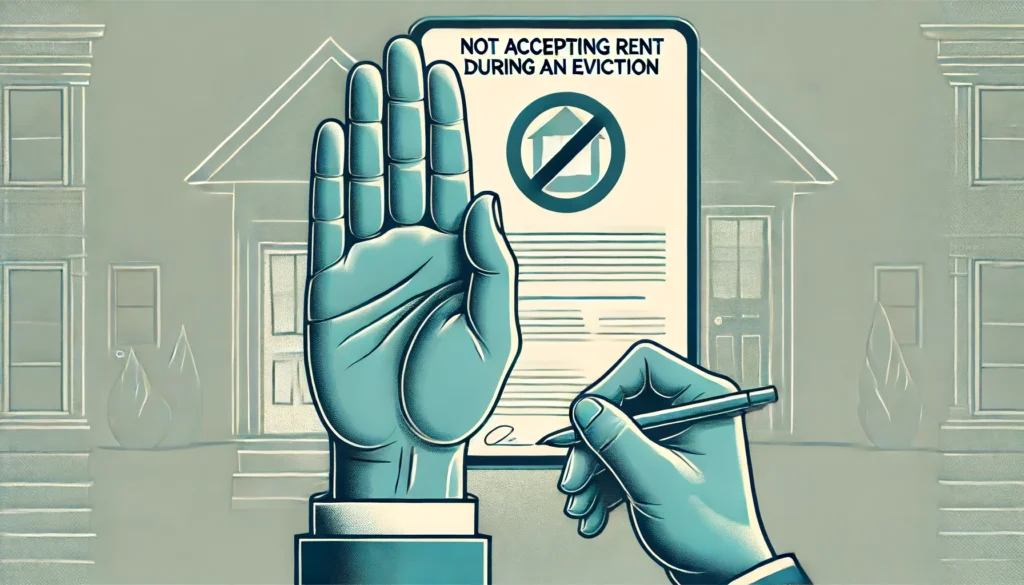
It is tempting to accept rent during an eviction. An eviction usually means the end of the landlord-tenant relationship. It might be the last chance to get any payment from the tenant.
In this post we discuss why this might be a very bad idea.
Frequently Asked Questions on Accepting Rent During an Eviction:
Accepting rent during an eviction is considered a waiver of the landlord rights. This means the tenant might automatically win the case.
A waiver in civil law is when the landlord knows the tenant breached the lease and still accepts rent.
Yes. Accepting rent during an active UD is a bad idea and will result in an automatic loss in most cases. If the landlord accepts rent before an eviction, it could still be considered waiver, depends on if the acceptance is before or after the notice to evict expires.
Landlords should include anti-waiver in their leases, that states that any acceptance of rent by the landlord is not a waiver of any right by the landlord.
The eviction will be lost most likely. The tenant will have an affirmative defense of waiver. The tenant can then file a motion for summary judgment or win at trial. Landlord will have to pay costs, and re-file the eviction against the tenant.
if the landlord intends to keep the tenant long term, landlords should accept rent but only via a written amendment. Landlords should consult a lawyer before accepting rent.
The landlord should take steps to refund the money paid immediately and notify the their lawyer.
Need Help from a Los Angeles Eviction Lawyer?
Reach out to Sinai Law Firm and take the first step toward resolving your tenant issue.
Accepting Rent During an Eviction can be a Waiver
Landlords that accept rent during an eviction will most likely lose the case. The tenant can argue that payment and acceptance of rent are a waiver of the eviction. A waiver occurs when a landlord knows of a breach and accepts rent anyway. With knowledge of the breach, the landlord waives the right to enforce the agreement.
Why does the law treat acceptance of rent as a waiver of rights?
To evict the tenant, the landlord has to declare forfeiture in the eviction notice. Collecting rent after declaring the termination of the lease are two competing ideas.
A landlord a judgment for damages at the conclusion of the eviction. Rent acceptance before a judgment will bring a waiver defense (most of the time).
Accepting Rent – Eviction for Non-Payment of Rent
Accepting rent during an eviction for non-payment of rent will most likely result in a waiver. An eviction notice has to precede an unlawful detainer action to be successful in court. In evictions for non-payment of rent, the eviction notice is usually called a ‘3-day notice to pay or quit’.
The eviction notice has strict compliance laws that landlords must follow. CA Civil Code 1161(2) governs eviction notices for nonpayment. Local rent control rules might also apply special rules for the termination notice. To be valid, a notice to pay or quit must state the exact rent owed by the tenant. Accepting rent from the tenant changes the amount owed to the landlord. Which then means the notice is now defective.
Accepting Rent – Eviction Not Based on Non-Payment of Rent
Accepting rent during an eviction for reasons other than non-payment of rent, the risk is still waived but for different reasons. The difference lies in a subtle distinction in the definition of damages in trial to the landlord in California Civil Code 1174.
In evictions based on breach of the lease the landlord can get a judgment for ‘damages’ but not for ‘rent’. (see Saberi v. Bakhtiari, 169 Cal.App.3d 509 (1985)). Damages in an unlawful detainer are the reasonable daily rental value for the unit. In trial, defense can present evidence the market rate is lower than the actual rent in the lease.
What is a Waiver in a Civil Action?
Waiver is an affirmative defense in a civil action. It is an intentional relinquishment of a right, by express agreement, or implied by action. To prove waiver the tenant has to prove 2 things in trial:
- Landlord was aware of the breach by the tenant; and
- Despite knowledge of the breach, the landlord continued to accept rent from the tenant.
Accepting Rent Before the Eviction Notice Could Also be a Waiver
If you find out a tenant violated the agreement, you must take steps to enforce the lease immediately.
For example – tenant agrees to pay utilities per a signed lease agreement. Despite what’s in the lease, tenant never pays utilities and the landlord is aware of it. The landlord continues to accept rent from the tenant. The landlord does not send a notice to the tenant to pay utilities.
This is an example of a waiver by the landlord. The waiver in the above example will apply to the part of the contract to pay utilities. The landlord won’t be able to evict the tenant for failure to pay utilities due to waiver of that right. The landlord was aware of the breach by the tenant but continued to accept the rent,.
To avoid waiver, a landlord should take the following steps immediately after a breach:
- Serve the tenant a 3-day Notice to Pay or Quit or a 3-Day Notice to Perform or Quit
- Send the tenant a notice of default or a warning, indicating a breach of the lease
- File an eviction for non-payment of rent or breach of the lease
Anti-Waiver Clauses
An anti-waiver provision in a lease agreement is a simple way to avoid a waiver defense in trial. A lease with this wrinkle in it means the parties agree that acceptance of rent is not a waiver of any rights. In other words, acceptance of rent by the landlord is not a waiver by way of contract.
Anti-waiver clauses are not a bulletproof defense. It’s possible for landlords to waive the anti-waiver provision. Even if your lease has an anti-waiver clause, don’t accept rent from the tenant during an eviction.
What Will Happen to Your Eviction Case if You Accept Rent? (or after notice but before filing)
Accepting rent can result in any (or all) of the following:
- Motion for Summary Judgment – the tenant can ask the court to rule in his favor without a trial via a MSJ. To win via summary judgment the tenant has to show a valid affirmative defense in waiver. Accepting rent during an eviction is one way to do so.
- Defense Verdict in Trial – the defense can also raise the waiver issue in trial and win via jury/bench verdict. The judge will instruct the jury to make a decision on waiver. If the defense can show the essential elements of waiver, the tenant will win the trial.
- Voluntary Dismissal – jury trials are expensive and unpredictable. Dismissing the lawsuit and starting over might be cheaper and faster to avoid a loss in a jury trial.
- Costs/Attorney’s Fees – losing the case means that you might have to pay the defense costs. In some cases you might have to pay the tenant’s attorney’s fees as well.
Using Electronic Payments to Accept Rent
Today, it is common for landlords to use electronic payments to collect rent. They are easier to track and for tenants to pay compared to checks. However, when it comes to evictions, landlords should take extra care with electronic payments.
To avoid a waiver, it is important to block electronic payments from the tenant and track electronic payments from a defendant tenant. If you receive any payments during an eviction, you must refund the money quickly.
Accepting Partial Rent During an Eviction
Residential landlords should always reject partial rent payments after a notice to evict. Accepting partial rent after a notice to pay or quit will nullify it, and accepting rent after a notice to cure risks a waiver defense.
Accepting partial rents in commercial evictions is not a waiver. Per California Civil Code 1161.1(c), landlords can accept partial rent and still evict the tenant. Commercial landlords should consult a lawyer before accepting any rent from a tenant.
Accepting Rent After 3-day Notice but Before an Eviction
It is important to understand the impact of rent acceptance at different times of the eviction process. Generally speaking, the eviction process is as follows:
- Tenant defaults
- Landlord serves eviction notice
- Termination notice expires
- Filing an unlawful detainer action against the tenant
Acceptance of rent has different consequences in each part of the process
- Accepting rent after default but before the eviction notice – might be a waiver by the landlord of that specific breach.
- Accepting rent after eviction notice served but before it expired:
- Eviction for nonpayment of rent – if the tenant paid the amount stated in the notice, no action can be taken.
- Eviction for other reasons – consult with their lawyer about accepting rent. It might be a waiver based on language in the lease agreement.
- Partial Payment – residential landlords should refuse any partial payments. A new notice to pay or quit will have to served for the difference. Commercial landlords can accept partial rent.
- Accepting rent after the eviction notice expired
- Non-Payment of rent – accepting any rent after the pay or quit notice expires will nullify it.
- Breach of the lease – accepting rent after the time expires in the eviction notice might be a waiver of the notice.
- After filing – accepting any rent from a tenant during an eviction might be a waiver of your right to evict. If your goal is to get possession of the property, don’t accept rent during an eviction.
Should Landlords Ever Accept Rent From a Defaulting Tenant?
Before considering an unlawful detainer every landlord should ask herself:
"What is my goal?"
The decision to accept rent should based on the goal stated above. If the goal is possession of the property, never accept rent.
If the goal is to collect missed rent payments from a defaulting tenant, accepting rent is an option. A tenant who is hard to replace is a another good reason to accept rent despite a breach. This is more common in commercial tenancies where the leases are longer.
In cases where the landlord does not want to evict the tenant and accept partial rent, consult with a lawyer. It is important to accept rent during an eviction or a default only via a written agreement. Landlords might ask the tenant to increase the security deposit as consideration.
Generally speaking, landlords should file evictions if the goal is possession. Filing an eviction for an unlawful purpose can expose landlords to liability. For example – filing a UD to force a tenant to pay back rent.
Hire the Right Law Firm For your Eviction Case
It is easier to defend an eviction case than to prosecute one. There are more ways for tenants to win on a technicality than available for the landlord. With. proper representation landlords can avoid these legal landmines. Accepting rent during an eviction is a common mistake. A loss of your case means the landlord will have to do the following again:
- Drafting and re-serving the eviction notice
- Refiling the unlawful detainer action
- Service the lawsuit on the tenant
- Paying more court and filing fees
- And wasting more time.
Sinai Law Firm is a full service eviction firm. We have a proven track record of performance in eviction litigation. Unlike other eviction lawyers we are always prepared to go to trial. To schedule an appointment or hire the firm contact us today and get a response in 24 hours or less.
